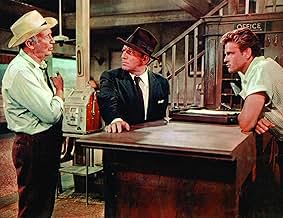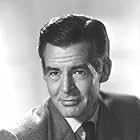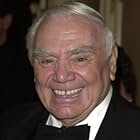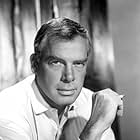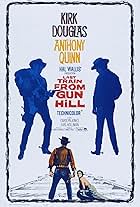Following World War II, a one-armed stranger arrives in a tiny California desert town, but finds the residents hostile and protecting a terrible secret they want to keep hidden, by violent m... Read allFollowing World War II, a one-armed stranger arrives in a tiny California desert town, but finds the residents hostile and protecting a terrible secret they want to keep hidden, by violent means if necessary.Following World War II, a one-armed stranger arrives in a tiny California desert town, but finds the residents hostile and protecting a terrible secret they want to keep hidden, by violent means if necessary.
- Nominated for 3 Oscars
- 4 wins & 8 nominations total
- Cafe Lounger
- (unconfirmed)
- Cafe Lounger
- (unconfirmed)
- Cafe Lounger
- (unconfirmed)
- Cafe Lounger
- (unconfirmed)
- Second Train Conductor
- (uncredited)
- First Train Conductor
- (uncredited)
- One of Two Porters
- (uncredited)
- Tall - White-haired Cafe Lounger
- (uncredited)
- Director
- Writers
- All cast & crew
- Production, box office & more at IMDbPro
Storyline
Did you know
- TriviaJohn Sturges had already moved on to his next film, The Scarlet Coat (1955), so Herman Hoffman took charge of filming the opening. The plan was to shoot the train hurtling toward the audience, almost like a 3-D movie, but it would have been deadly to attempt a helicopter maneuver into the path of a speeding locomotive. Stunt flier Paul Mantz offered the perfect solution: have the train running backwards, fly the copter over the retreating engine, then project the footage in reverse. "It's a helluva shot," Sturges later said, "but I didn't make it."
- GoofsAs the train approaches the town, the horn blows twice, which is the signal for starting up. The mandatory signal for a grade crossing (long, long, short, long) is never blown, although one clearly exists. When the train departs, the conductor makes a confused hand signal to the engineer resembling the horizontal motion that means "stop" rather than the vertical motion that means "go". The engineer never responds with the "long, long" starting signal.
- Quotes
Coley Trimble: You're a yellow-bellied Jap lover! Am I right or wrong?
John J. Macreedy: You're not only wrong. You're wrong at the top of your voice.
Coley Trimble: [gets ready to scrap] You don't like my voice?
- Alternate versionsTo receive an 'A' (PG) certificate in 1955 the UK cinema version was subject to heavy BBFC cuts. These included Macreedy striking Hector with the brass fire hose nozzle and the climactic shots of Reno on fire. Later TV showings and video releases were fully uncut.
- ConnectionsFeatured in The Spencer Tracy Legacy: A Tribute by Katharine Hepburn (1986)
I read a review of the film on IMDB pointing out the flaws in the script. They are all correct, if we go by rational thinking. But the merits of this film are the superb editing, the beautiful cinemascope photography and the arresting performances. Every time I see this film I am reminded of Spielberg's little known film "Duel" that had similar thrilling tension packed into less than 24 hours of screen time--a film I admire much more as good cinema than the recent box office outputs of Spielberg.
Compare this film with Sturges' "The Magnificent Seven." Sturges like King Vidor, seemed to pick up stories to film that looked at the oppressed and tried to present a world that could be better. "The Magnificent Seven," like this film, had a predominantly male cast. It appealed to most viewers. And some could see a social and even a political layer beneath these films.
What I find most appealing is the the ability of Sturges, Vidor, and the early unsung Spielberg's ability to use cinema to combine thrills, human values and craft in say 81 minutes as in this film. Spencer Tracy is not to be admired for the way he delivers his lines, but his body movements which remind you of majestic caged animal that can be deadly if provoked. Sturges brings to the fore evil in different ways--the dead buck strapped on the front of a vehicle, menace on empty roads by big vehicles (used in "Duel" to great effect), evil women when you expect them to be good, laws used in illegal ways (the hotel registration scene), etc. Sergio Leone made similar films in Europe--the famous spaghetti westerns--with laconic dialogues and emphasis on body movements and photography
In spite of its flaws, it is a film Hollywood can be proud of. I only hope TV reruns show the film in its original cinemascope grandeur, which grabbed me the first time I saw it decades ago.
- JuguAbraham
- Jan 23, 2002
- Permalink
Details
Box office
- Budget
- $1,271,000 (estimated)
- Gross worldwide
- $10,813
- Runtime1 hour 21 minutes
- Color
- Aspect ratio
- 2.35 : 1
Contribute to this page





